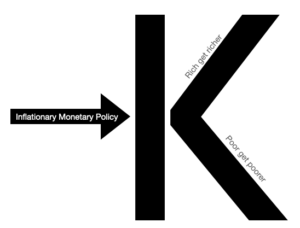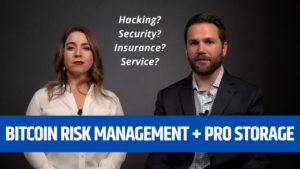By far, one of the most luring propositions is
Fund your dream business with your retirement fund
“But, how?” you ask, “isn’t it a prohibited transaction to invest your plan (IRA/401k) into something that involves myself as disqualified person?”
Yes. As a general rule, it is prohibited for your plan to invest in a business that you own or run. An exception to that rule is what is promoted through:
The arrangement works with a prohibited transaction exemption [IRC 4975(d)(13)] for what is called “qualifying employer securities”. This is how these arrangements are structured:
- A C Corporation is formed
- This new corp then sponsors a qualified plan (such as a 401k or profit sharing plan)
- The customer’s existing retirement funds are transferred into the new plan
- The plan then purchases a significant portion of the new corp’s stock as qualifying employer securities
Ordinarily, this would be a PT, but based on the special exemption, it is okay that the plan is buying shares in the participant’s company, the participant is paid a salary from the company which is funded mostly from the plan, and the participant works for the company which is owned mostly by the plan.
For this “qualifying employer securities” arrangement to exist, the plan documents must allow for investment into QES and the corporation’s bylaws must allow for QES and a corporate resolution must be made to approve the QES transaction.
Theoretically this can be a very powerful concept. In my honest opinion, however, this arrangement is often being promoted regardless of suitability.
Sales Pitch A – Access your retirement funds NOW
“Do you want to benefit now from your retirement funds before age 59 ½? Just use this QES arrangement!” Let’s examine this further below in some examples. I hate to spoil it for you, but of all the options to receive your retirement funds earlier than 59 ½, the QES arrangement results in maximum taxation.
Sales Pitch B – Make your business income tax deferred
This is simply a half truth. The business income is taxed at the corporate level. Let’s examine:
QES funds legitimate business, but there’s no profit
Jerry wants his retirement funds NOW, but he’s only 45. He doesn’t want to pay distribution taxes & penalties, so this sales pitch appeals to him. He sets up a Rainmaker plan, but his business never makes a profit. That’s okay, he thinks, because I really just wanted access to my retirement funds. But at what cost was this access granted? Firstly, the only money he makes is what his corporation pays him through a W-2. So he pays taxes on this personal income after all that work to “get around the distribution taxes”. Any money he has spent on trying to get the business off the ground would likely exceed the 10% penalty he would have incurred for just directly distributing from his retirement accounts. Plus, he’s spent $4,000 to $5,000 to setup the arrangement in the first place.
Conclusion: He would probably receive less money (net of taxes) through his QES arrangement than he would through direct plan distributions.
QES funds questionable business, but there’s no profit
Joyce wants her retirement funds NOW, but she’s only 50… so she sets up an ERSOP. She never really tries very hard to make the business successful, so her situation is just like Jerry’s except she hasn’t spent that much money on business expenses outside of paying herself a salary. She still ends up paying taxes on her personal income. She thinks she’s clever because she kept her expenses low, but all in all the IRS & DOL may question whether this business was truly created with the intentions of making or selling products or services for a profit. If they conclude “no”, then the entire arrangement may be deemed a “sham” and past due taxes, interest, and penalties assessed.
Conclusion: Joyce’s income (which comes from retirement fund money) is taxed as ordinary income. She receives no tax beneift. Further, she is operating a sham entity that will upset the IRS in an audit.
QES funds legitimate, profitable business
Jill has a great business idea, uses the Guidant’s Audeo QES arrangement to fund it, and lo and behold, it’s a success! As the first example with business income,
- She is still paying ordinary income taxes on the compensation she personally receives (She did not circumvent the taxes she would have paid to distribute her retirement funds to herself)
- Her plan receives its income after corporate taxes are paid. This means her plan’s income will be taxed once at the corporate level and once again later at distribution. This is just bad planning that results in maximum taxation.
Conclusion: Jill still paid taxes on her personal income (that came from her retirement money and its further returns) and the income of her retirement plan is subjected to corporate taxes. This strategy accomplishes little to nothing in the way of tax minimization.
A better way to access your funds NOW
Did you know that you can distribute your retirement funds to yourself at any age without triggering the 10% penalty? All you have to do is agree to abide by a regular payment schedule until you either turn 59 ½ or take distributions for 5 years… whichever is longer. There’s plenty of strategies to follow that make these schedules flexible for anyone who has a fair amount of retirement funds. More on this in a later post…
Sales Pitch C – Quit your job and follow your dreams
Like most people, you probably have a dream or two about starting a business that you would love running. I think this plays a bit strongly on most people’s emotions. Most people are tired of working for someone else, and they want the flexibility and freedom that can be made possible by starting a small business.
The problem is that 90% of small businesses fail in the first 7 years. 90% of the survivors fail in the second 7 years. This famous Department of Commerce study tells us that if you are starting a small business, you have a 99% chance of failing. How do you like those odds? They are worse than the odds you get from a casino… many times over. To complicate matters, many people cite that the #1 reason for small business failure is not enough capital. Now, my goal isn’t to deter you from starting a business. For me, starting and running businesses has been extremely gratifying. I’ve started over a dozen businesses, some of them were profitable successes, but probably the most important lesson I can share is that most of them were failures. In fact, what seems to be the key to a successful entrepreneur is willingness to fail and persevere. Thomas Edison famously created the lightbulb after making 10,000 failed prototypes.
If willingness to fail is a key component to eventually achieving success, then I contend that you shouldn’t use your tax favored retirement funds to fund your first small business. Even if you have a successful small business, I would strongly discourage you from funding another small business unless it is in the same field. If it took 10, 15, or 20 years to build your retirement account up it seems silly to risk any significant portion in starting a small business.
When is it prudent to use the QES arrangement?
Because starting a small business statistically carries extraordinary investment risk, I see two situations in which capitalizing it with retirement funds would be acceptable:
- When only a small portion of retirement funds are used. Common sense (and modern portfolio theory) says that it’s good to take a small portion (say 10%) of a portfolio and subject it to high risk. The rest should be invested in assets that have less risk than a small business startup. You can expect a small businesses to cost $50,000 to $500,000 to start, so this avenue would require the retirement account to have $500,000 to $5,000,000 of available funds.
- When starting a duplicate business. If you own a consistently successful Italian restaurant on the east side of town and find that there is sufficient demand to start another Italian restaurant on the north side of town, then maybe your experience will limit your risk and increase your chances of success. (Of course the new restaurant will need to be a new C Corp to simplify valuation issues for the plan’s QES purchase.) If you’ve only owned one restaurant for 5 years, maybe limit your retirement fund investment to around 25% of your portfolio. If you’ve owned 3 of these restaurants for 12+ years (and already experienced your fair share of failures), then it might make sense for you to risk even more of your portfolio. I’m just giving theoretical examples; you come up with your own rules, but be realistic.
Under no circumstances does it make sense for a person to invest a large portion of their retirement funds into a new small business in which they have not already proven their success.
Now, let me clarify: It can make sense for a person to start a new business venture with or without experience. Just figure out how to capitalize it without risking tax favored retirement funds. If you lose/spend all your funds on a business failure, can you afford to build your retirement account back up over another 25 year period?
If #1 or #2 above doesn’t apply to you, but you still want to start a business, raise capital from others… even raise capital from other retirement funds. This may cause you to justify your ambitions and expectations more thoroughly. If you can’t convince other people to invest in your new business, then should you be investing in it? Sometimes people have a hard time seeing the reality of their own situation. We’ve all had that friend who thinks their ugly baby is adorable. If you can’t think of that friend, it might be you! I remember that when I played basketball in school I thought I was really good. Then I watched a video tape of me playing and saw a different story. I clashed hard with reality. That realization helped me work to become a better basketball player. Don’t let your “video tape” incident result in a loss of your oh-so-tax-favored funds.
There’s a whole world of people out there ready to invest in sound business startups. It starts with your friends and family and extends into angel investors.
I know this doesn’t sound as sexy as “live your dream NOW – it’s so easy!” but this sound approach leaves no nasty hangover.
At the very least, if you are considering one of the QES approaches, find as many people as you can who have used this approach and judge their results. This might be difficult because the companies who promote the QES will probably put you in touch with their best success stories rather than people whose results are common.
Franchises to increase odds of success
For most QES promoters, buying a franchise is offered as a method of reducing risk. My experience with franchisees doesn’t paint that picture exactly. On one end of the spectrum things are very lucrative. A client of mine bought one of the first Sears Auto franchises well over a decade ago, and he has profited immensely from it. He locked in his franchise fees long ago when the franchise was less established and therefore carried more risk. On the other end of the spectrum, I have a friend who bought two Blimpie franchises just a couple of years ago. When he bought them, Blimpie was an established brand and franchise. As things turned out for him, he only profits if he actively manages the businesses. There’s not enough profit for him to hire a reliable, competent manager… so he has effectively bought himself a job managing a sandwich shop… far from his dream. From my perspective, the latter results are undesirable. The results of the Sears Auto are desirable but they carried a lot of risk, and it probably would have been unsuitable for a retirement account investment.
The bottom line is that starting a small business is very risky. If you are convinced that you can minimize that risk well, prove it to yourself by getting others to invest in your new biz. Leave the retirement funds for their intended purpose – passive investments.


